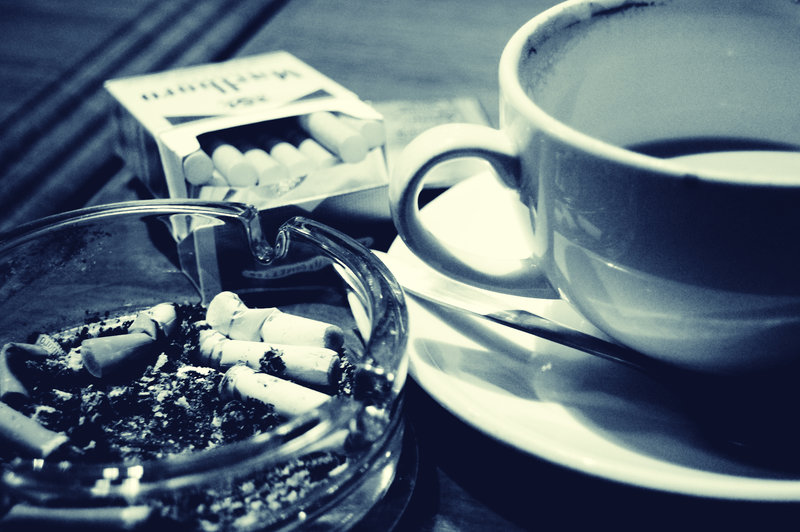Research Suggests That Cigarettes’ Power May Not Be In Nicotine Itself

Nicotine addiction may cause a more powerful effect when combined with coffee.
There may be a very good reason why coffee and cigarettes often seem to go hand in hand.
A Kansas State University psychology professor’s research suggests that nicotine’s power may be in how it enhances other experiences. For a smoker who enjoys drinking coffee, the nicotine may make a cup of joe even better.
And that may explain why smoking is so hard to quit.
“People have very regimented things they do when they smoke,” said Matthew Palmatier, assistant professor of psychology at K-State. “If you think about where people smoke or who they smoke with, you realize that it occurs in very specific places, often with a specific group of people. Maybe it’s a reason why nicotine is so addictive – if you get used to having that extra satisfaction from things you normally enjoy, not having nicotine could reduce the enjoyment in a given activity.
“People may not be smoking to obtain a pleasurable drug state. They may be smoking in order to regulate their mood, and that effect could make nicotine more addictive than other drugs.”
Palmatier said much previous research on nicotine addiction has looked at the drug itself rather than the other factors he is studying.
“The approach we’re taking is out of left field,” he said. “But it seems to be one of the best explanations as to why people smoke.”
Palmatier has a grant from the National Institute on Drug Abuse to understand how this phenomenon can be used to better design tobacco addiction treatments, usually offered in patches and pills. He began psychological research in addiction as a graduate student and later began researching the reinforcing effects of nicotine.
“The big picture is trying to figure out why people smoke,” Palmatier said. “There are a lot of health risks, and the majority of smokers already know what they are. They want to quit but can’t. It’s not because nicotine is a potent drug; it doesn’t induce significant amounts of pleasure or euphoria. Yet, it’s just as difficult if not more difficult to quit than other drugs.”
At K-State, Palmatier studies rats that are allowed to self-administer nicotine by pushing a lever. The main source of light in their testing environment shuts off when the rats earn a dose of nicotine. After about a minute, the light comes back on to signal that more nicotine is available.
By manipulating this signal, Palmatier and his colleagues found that the rats weren’t really that interested in nicotine by itself.
“We figured out that what the rats really liked was turning the light off,” Palmatier said. “They still self-administered the nicotine, but they took more of the drug when it was associated with a reinforcing light.”
Palmatier and colleagues published a paper on their research in the August issue of Neuropsychopharmacology.
Palmatier has begun looking at how rats respond to sweet tastes after having nicotine. He said preliminary results show that nicotine has comparable effects on sweet tastes. That is, rats respond more for sugar-water solutions after getting nicotine.
“The taste aspect is really important because we can actually figure out how nicotine is increasing the subjects’ behavior,” Palmatier said. “If it makes a reward more pleasurable, then it may increase the palatability of a sweet taste.”
Palmatier said that a future phase of research would be determining whether nicotine can make unpleasant experiences more tolerable, helping explain why lighting up after a bad day at work can be tempting.
_______
source: Medical News Today